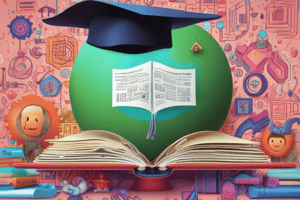Podcast
Questions and Answers
Transformative learning can only be triggered by new information.
Transformative learning can only be triggered by new information.
False (B)
TVET programs focus on theoretical knowledge without practical skills training.
TVET programs focus on theoretical knowledge without practical skills training.
False (B)
Lifelong learning is only beneficial for personal development and not for building a sustainable future.
Lifelong learning is only beneficial for personal development and not for building a sustainable future.
False (B)
Sustainability literacy is not related to environmental, social, or economic sustainability issues.
Sustainability literacy is not related to environmental, social, or economic sustainability issues.
Lifelong learning opportunities should not be accessible to all individuals regardless of age, background, or location for sustainable development.
Lifelong learning opportunities should not be accessible to all individuals regardless of age, background, or location for sustainable development.
Explain the three main ways that learning can take place according to the passage.
Explain the three main ways that learning can take place according to the passage.
How does transformative learning differ from other types of learning?
How does transformative learning differ from other types of learning?
What are the key aspects of lifelong learning from a sustainability perspective?
What are the key aspects of lifelong learning from a sustainability perspective?
How does TVET (Technical and Vocational Education and Training) combine theoretical and practical learning?
How does TVET (Technical and Vocational Education and Training) combine theoretical and practical learning?
What is the role of lifelong learning in building a more sustainable future?
What is the role of lifelong learning in building a more sustainable future?
Which of the following is NOT a way that learning can take place according to the passage?
Which of the following is NOT a way that learning can take place according to the passage?
What is the key difference between transformative learning and other types of learning according to the passage?
What is the key difference between transformative learning and other types of learning according to the passage?
What is a key aspect of lifelong learning from a sustainability perspective according to the passage?
What is a key aspect of lifelong learning from a sustainability perspective according to the passage?
How does the passage describe the focus of TVET (Technical and Vocational Education and Training) programs?
How does the passage describe the focus of TVET (Technical and Vocational Education and Training) programs?
What is one way that lifelong learning can contribute to building a more sustainable future according to the passage?
What is one way that lifelong learning can contribute to building a more sustainable future according to the passage?
Match the following terms with their definitions related to lifelong learning:
Match the following terms with their definitions related to lifelong learning:
Match the following aspects with their descriptions related to forming a training pathway:
Match the following aspects with their descriptions related to forming a training pathway:
Match the following statements with the examples provided for each aspect of lifelong learning:
Match the following statements with the examples provided for each aspect of lifelong learning:
Match the following sources of learning with their descriptions:
Match the following sources of learning with their descriptions:
Match the following benefits with their explanations in the context of lifelong learning:
Match the following benefits with their explanations in the context of lifelong learning:




